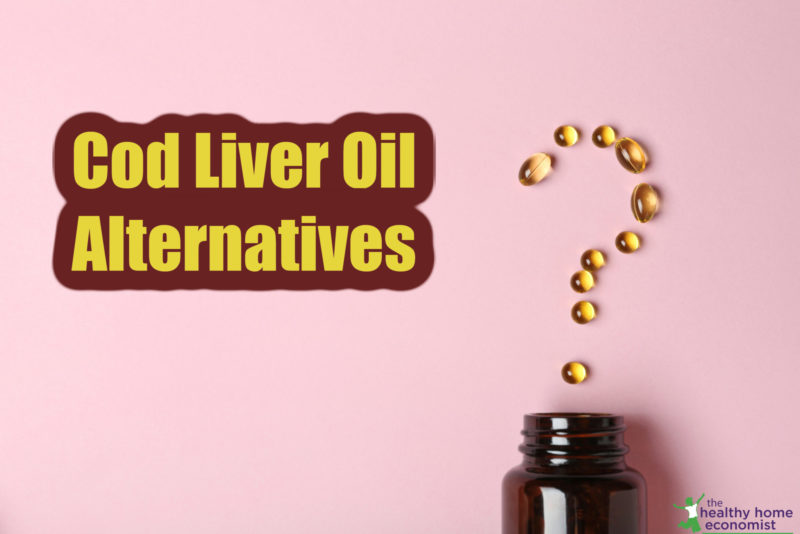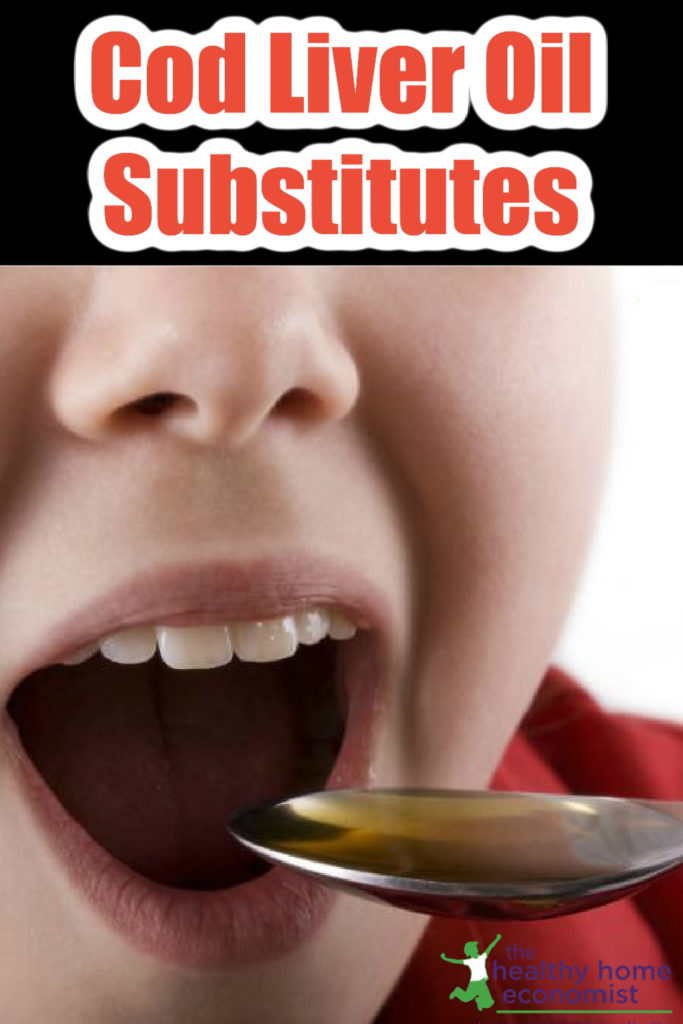Table of Contents[Hide][Show]
The best whole food alternatives for the nutrients in high vitamin cod liver oil for those who have dietary restrictions that preclude the consumption of fish due to allergy or food philosophy. 
I’ve received a surprising number of emails recently from people who have a fish sensitivity who are seeking an alternative to cod liver oil in the diet.
This is a request I’ve encountered rarely in the past. What might be going on? Have these individuals perhaps unwittingly been eating genetically modified salmon? This frankenfood is quite deceptively labeled as “sustainable salmon”. Could a fish allergy be an unexpected side effect of consuming this unnatural seafood?
Whatever the reason, sensitivity to fish can certainly make following a healthy diet a bit more challenging.
This is because a small daily dose of unprocessed high vitamin cod liver oil is an easy-to-implement “insurance policy” for health especially during times of high stress.
Raw cod liver oil has been used for centuries to bolster the immune system, particularly during the winter months.
So, what is the best substitute for this whole food supplement when a fish allergy or sensitivity is diagnosed?
The good news is that you can definitely substitute other whole food sources for the nutrients in cod liver oil.
Let’s examine each of the critical nutrients in cod liver oil and what non-ocean-based whole foods can best substitute for them.
Substitutes for the Fat-Soluble Vitamins in Cod Liver Oil
Natural vitamins A and D are the most important nutrients in unprocessed brands of fish liver oils.
When we run out of cod liver oil in our home, here is what we substitute for each of these fat-soluble vitamins.
Vitamin A
Hands down, liver is the best source of natural vitamin A.
Eating several ounces of grass-fed liver once a week is the best way to get this vitamin in its natural form in your diet.
What if you cannot stomach liver?
Then raw desiccated liver capsules are the next best thing. This brand and this brand are safe, grass-fed, and tested to be free of glyphosate residue.
One teaspoon of extra virgin cod liver oil contains 3650 IU of natural Vitamin A. (1)
The equivalent amount of Vitamin A in grass-fed desiccated liver is 4 capsules. This amount contains 3500 IU of natural vitamin A. (2)
Vitamin D
There are three natural sources of vitamin D to try if you have a sensitivity to cod liver oil.
Fish Eggs
First, I would suggest wild fish eggs or “roe”. Some people that cannot tolerate fish do fine with roe. So, if your sensitivity is not too severe, I would suggest trying them. Note that farm-raised fish eggs contain a fraction of the Vitamin D as wild roe, so be careful with your sourcing!
According to testing by the Weston A. Price Foundation, one tablespoon of fish roe contains approximately 17,000 international units of vitamin D. (3)
One teaspoon of high vitamin cod liver oil contains approximately 350 IU of natural Vitamin D.
Hence, you would only need less than a quarter teaspoon of wild roe to get plenty as an alternative.
Pastured Lard
If your fish allergy is severe, then the next best alternative to cod liver oil is pasture-raised lard. One teaspoon of pastured lard contains approximately 500 IU of vitamin D.
Thus, you would need about three-quarters of a teaspoon of lard as a cod liver oil alternative. Off the spoon would be best to ensure you get enough. You could also cook with it, but you would need to be sure you used enough so that each serving of food would contain a sufficient amount of lard.
I recommend this brand of pastured lard.
Natural Vitamin D Drops
Some people who have a strong fish allergy may also avoid lard for religious reasons. In those cases, I would suggest this brand of natural Vitamin D drops.
The natural vitamin D3 is sourced from pure grass-fed, New Zealand sheep’s wool. Each drop contains about 1000 IU of vitamin D. Thus, taking one drop every other day in a small glass of water or juice would be a natural alternative to the daily nutrients from a teaspoon of cod liver oil.
Omega-3 Fatty Acids
In addition to natural vitamins A and D, each teaspoon of cod liver oil contains 1150 mg of inflammation-fighting omega-3 fatty acids.
If you are allergic to fish but can tolerate seafood, I would suggest krill oil as an excellent omega-3 source. This is the brand I prefer.
Some would suggest grass-fed beef too. However, the references I’ve seen indicate that, while very healthy overall, grass-fed beef does not contain significant amounts of omega-3 fats. Thus, you should not rely on it as a primary source. (4)
If you have a seafood allergy too and cannot do krill oil either, a plant-based omega-3 source is the next best thing.
My favorite source of plant-based omega-3 fatty acids is unrefined walnut oil. I don’t suggest flax because it contains hormone-disrupting isoflavones. This article on estrogenic foods triggering precancerous breasts contains more information about why flax isn’t a healthy omega-3 source.
I’ve vetted this brand of walnut oil.
Note that it is important to never heat walnut oil due to the heat-sensitive omega-3 fats. I suggest drizzling a teaspoon on your salads or taking it straight off the spoon. This would give you roughly 600 mg of alpha-linolenic acid (ALA), the plant-based form of omega-3 fatty acids. (5)
Nutrient Synergy
The nutrients in cod liver oil or its alternative whole food supplements are best assimilated and used beneficially by the body in the presence of either the animal or fermented form of Vitamin K2. Thus, it is strongly recommended that you check your diet to ensure you are getting enough of this “X-factor” nutrient.

References
(1) Cod Liver Oil Nutrition Label
(2) Beef Liver Nutrition
(3) Sacred Foods
(4) Health Benefits of Walnut Oil Linked to Its Omega-3 Content
(5) Fats in products from pasture-raised and confinement-raised animals








Sarah, your link for Radiant Life takes us to the page that has the liver from Argentina and I am wondering if you also meant to include the Silver brand liver from New Zealand ? Or are you recommending the Argentina liver over the New Zealand liver?
Either one is fine. I could only link to one, so I used the closest one to North America.
Hi Sarah, What about chia seed and perilla oil? Are these good? Thanks Jim Turner
ALA is a poor form of omega as it does not convert well in the body
I looked up the walnut oil you recommended, but the label says, “not a significant source of vitamin D”. Is there any other product you could recommend with higher Vitamin D3 content vitamin? Thank you!
Walnut oil does not contain Vitamin D. It contains omega-3 fatty acids that are a plant based alternative to cod liver oil. To get the vitamin d that cod liver oil also has, you will need to use on of the other alternatives listed in the article.
Thanks for your info Joe, I think you will find that a large number of people who have an aversion to cod liver oil is not so much to do with allergy as it is to do with humanitarian reasons, i.e, vegetarian or vegan. i am vegetarian and there is nothing that would make me ingest cod liver oil. I eat eggs and cheese occasionally provided they are ethically sourced but there is no way in hell I will consume anything that has come from any living creature that has had a face or bleeds. Period! i would rather lose my teeth to be honest then consume fish oil or pigs lard. Hell no!. I appreciate your efforts in providing this information, cheers.
will fish eggs blended in a smoothie help my 90 year old mother and 69 year old brother gain weight. she suffers from brain shrinkage and broke two hips within a month of each other and is not eating and is so small her false teeth no longer fit.
My brother is suffering from stage 4 colorectal cancer and she is about 100 lbs and he is about 125.lbs.
I would like to use ground flax seed drink like in the wap foundation book, would that cause any problems?
How about the ground up or grated raw liver, would that help them gain weight.
Sarah, no I didn’t ask about how much sun exposure they got, however they mentioned they were pasture raised.
It is definitely possible for the pigs to be pastured but not have much access to sun. For example, a farm near me has its pastured pigs that are mostly in the woods and heavy brush. I will have to look into this further!
I have some lard from Fatworks and noticed that they state vitamin D content as 0% on the label. I asked them about this and they said they had it tested multiple times from different farms and did not find any vitamin D, but did find some in the pig liver. I wonder why the discrepancy between their findings and other studies?
Hi Joe, thanks for this information. Perhaps this lard is not from pastured pigs? Did you happen to ask them if their pigs are kept outside in the sun? I had inquired about this some years ago and the answer was yes, but perhaps things have changed?